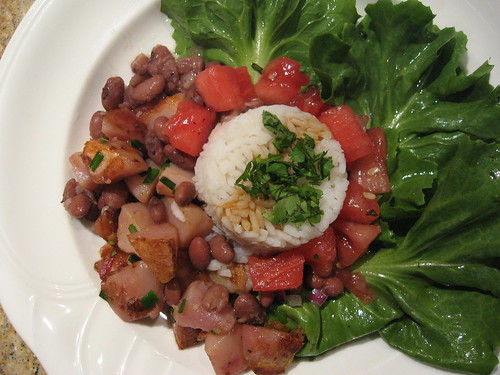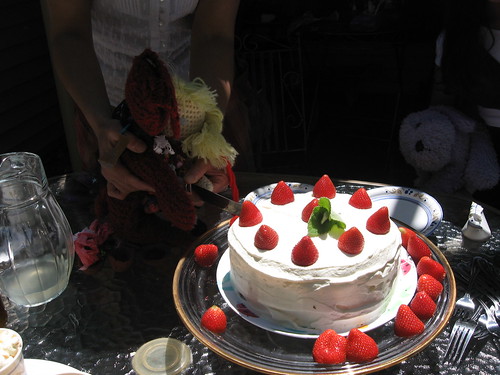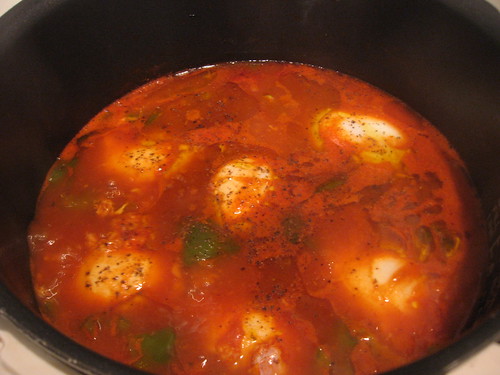 Isolation. Grab it quick. Skip it. Make it fast. Gulp it down. Pull it from a box. Panic.
Isolation. Grab it quick. Skip it. Make it fast. Gulp it down. Pull it from a box. Panic. Too often, these are the familiar words of our meal stories.
Says Margaret Kim Peterson, in her book
Keeping House, "In the modern American culture, in which 'busyness' can seem simultaneously like the badge of a good life and like a curse that is impossible to escape, finding time to eat or to feed others can become a challenge. People eat on the run; they feed their children in the car; they skip breakfast, eat lunch at their desks, and panic when it is dinnertime. Magazine headlines in the grocery store checkout aisle ('From Desperation to Dinner in 15 Minutes!') suggest that in too many households, the need of people for an evening meal has become a perpetual emergency." (p.107)
What to do?
This week I was inspired to rethink my own meal stories by Mark Galli's book
Beyond Smells and Bells: The Wonder and Power of Christian Liturgy. As you may suspect, Galli's book is not about cooking, not about food preparation, not really about eating at all. And yet.
Galli classifies the divisions of liturgical Sunday services as such:
gathering, word, sacrament, dismissal.
Gathering, he says, is "more than an efficient way to get things started." It begins with hymns and acclamation, signaling that "we are gathering as one people, not as a collection of individuals." It points to the way God plans to gather us, as prophesied in Isaiah...
On this mountain the LORD of hosts will make for all peoples a feast of rich food, a feast of well-aged wine, of rich food full of marrow, of aged wine well refined.This is followed by a journey into the
Word, where the "biblical story unfolds week by week". Then comes the
Sacrament, in which by "sharing this meal, we remember the whole sweep of our story." Finally, the
Dismissal "sends us out to participate in the great gathering work."
He concludes, "By participating in the liturgy, we're doing more than 'attending a service.' We are entering a story— a story in which we also play a role. We are the people who have indeed been gathered. We are the people who share in God's very life. We are the people sent forth to proclaim God's story and to invite people into the grand story."
Reading Galli's words, the centrality of both
food and
community struck me. I was taken back to Peterson's assertion that "The simple act of eating together is perhaps the most fundamental of all the ways in which food can express and foster the community that God desires should exist among people and between humans and God." (p.123)
Even as I cycled back to Peterson, I turned a curve and landed in Galli's court again. I began to think. Perhaps our humble mealtimes are a small opportunity to bring the power of Liturgy home. I began to question. How do I gather my family, what are the words of our mealtime story, what is embodied in our brief time together, how do we leave the table and go out into the world?
I like some of the answers I already have to these questions. We set the table together, we [generally] say grace, I have begun to read poetry to my children after I finish eating and they are still munching, I try to serve good food (if not "rich" like God in Isaiah) to nourish both body and soul, we clear the table together.
But I also see room for changes. Perhaps I could invite my children to prepare dinner with me more frequently. Maybe we could read scripture or the
Book of Common Prayer during the meal sometimes. Or we could do what one of my friends does: discuss our favorite and least favorite parts of the day. Would it be out of place to occasionally sing some hymns and take communion? Inviting others just a little more often could also be a worthy goal (particularly because weeknight meals mean we are without "daddy" at the table). Or we could even just
make more to give away.
We are not inspired by our culture to make our meal stories thick with love, community, liturgy. But we can rethink, revise our meal stories, aspiring to mirror God himself. As Peterson says, "There is a sense in which...scripture can be seen as an account of God's efforts to get humans back at the table with each other and himself."
Maybe we could begin with the simple act of coming to the table at home. With a story worth living, eating.
Quotes from Galli's book are taken from pp. 14-18. Chinese Potatoes photo, by L.L. Barkat.
Chinese PotatoesCut in chunks and saute until tender...• about 4 potatoes (or more, depending on desired quantity)
Toss in and saute until warmed...• 1/2 - 1 cup cooked red beans
• small handful of scallions or chives, chopped
• 1 garlic, minced
Pour on...• soy or tamari sauce to taste
• about 1 tsp regular dark or spicy sesame oil
Serve on bed of lettuce, topped with chopped tomatoes and "castle" of rice garnished with soy sauce, regular sesame oil and chopped cilantro.Labels: Beyond Smells and Bells, community, Keeping House, life management, Margaret Kim Peterson, Mark Galli, story













